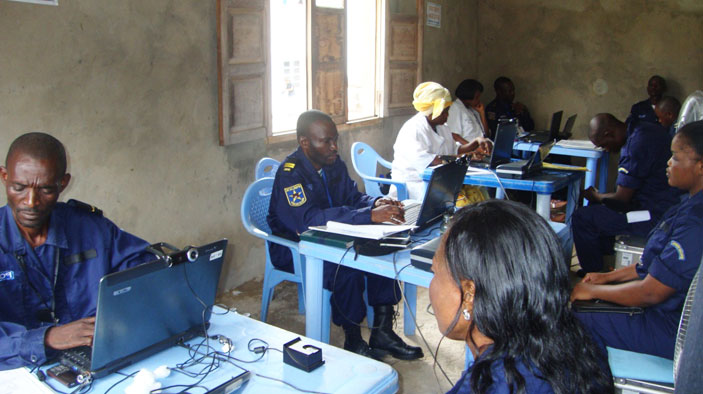Democratic Republic of the Congo—Security Sector Accountability and Police Reform Programme (SSAPR)
Client: Foreign, Commonwealth & Development Office
Duration: 2009-2015
Region: Sub-Saharan Africa
Country: Democratic Republic of the Congo
Solutions: Fragile States
The Democratic Republic of the Congo (DRC) has for decades been riven by war, corruption, and inadequate governance. Too often, the security and police forces have been part of the problem rather than the solution for the Congolese people, operating within a culture of impunity that perpetuates a cycle of violence, conflict, and criminality. If we are to help address poverty and establish democratic systems responsive to the needs of the DRC’s citizens, we must simultaneously address this fundamental issue of human security.
Against this backdrop, the United Kingdom in 2010 launched the Security Sector Accountability and Police Reform (SSAPR) programme, a five-year pilot initiative to promote accountability and support the national police reform process. DAI implemented the External Accountability Component of this programme in the provincial capitals of South Kivu, Bas-Congo, and Western Kasai.
DAI’s team strove to create conditions for publicly accountable policing, restore popular trust, and redefine security as a collective interest of citizens and police alike. We collaborated with local communities, schools, religious institutions, media outlets, nongovernmental organizations, elected national and provincial officials, Police Nationale Congolaise agents, and local leaders. In the process, we gained insight into the mechanics of community-driven change that might be applied or adapted to programming in other environments suffering from unresponsive or predatory public institutions.

Sample Activities
- Support the national parliament and three provincial parliaments to improve their oversight of the security sector (including military and police) and justice agencies.
- Work with civil society, researchers, and media to develop their understanding of the security and justice system so they can better represent the population.
- Improve the effectiveness of civil society organizations to maximize their impact on policymakers and providers of security and justice services.
- Help individuals and community groups in three pilot provinces create new relationships with the local security and justice institutions to improve local security.
Select Results
- Helped draft decree to establish a Local Security Committee.
- Reached 1.2 million women, men, girls, and boys through 90 awareness-raising and community mobilisation projects and 225 citizens forums on local justice systems and how to avoid extortion, bribery, and mob justice; 329 community zones formed and operational, enlisting 1,947 women and 4,070 men practicing Dynamique Communautaire to express security and justice needs.
- Provided technical and logistical assistance to the drafting of the law on the national police force.
- Educated 71,000 students on national security and justice institutions, with 235 school teachers, school inspectors, and prefects trained in 109 secondary schools.
- Supported civil society organizations in their efforts to monitor security reform and security issues, including human rights violations, during the electoral period.
- Funded civil society organizations for the monitoring of the first-ever police census.
- Developed a communications strategy aimed at helping the media cover security issues more effectively, thereby better informing citizens.
Featured Links
RELATED CONTENT:
Worldwide—Social Protection Technical Assistance, Advice, and Resources (STAAR) Facility
The Social Protection Technical Assistance, Advice, and Resources (STAAR) Facility is dedicated to expanding and improving the effectiveness of investments in gender-responsive social protection and social protection approaches in crises.
Read More